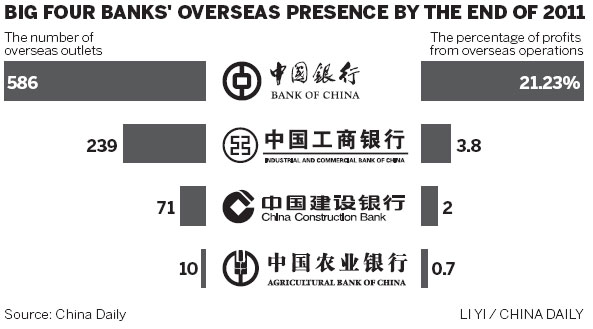China's major lenders broaden horizons
Updated: 2012-07-31 09:23
By Wang Xiaotian (China Daily)
|
|||||||||||
Major lenders from the world's second-largest economy are expected to accelerate their aggressive program of global investments of recent years, especially in the wake of the financial crisis.
Although still highly dependent on domestic business, all major players in the Chinese banking sector are predicted to strengthen their international positions - but market watchers are also cautioning that much still needs to be done to improve their chances of winning a larger share of the pie, faced with fierce foreign competition.
Figures reveal that from the end of 2008 to the end of 2011, foreign assets of the Big Four banks - Industrial & Commercial Bank of China Ltd, China Construction Bank Corp, Bank of China Ltd and Agricultural Bank of China Ltd - have mushroomed from 2.41 trillion yuan ($379 billion) to 4.13 trillion yuan.
"The internationalization of Chinese lenders will become inevitable and we see more mergers and acquisitions outside China by those banks as well as more overseas branches," said Guo Tianyong, director of the Research Center of the Chinese Banking Industry at the Central University of Finance and Economics.
He said that China's tight control over credit has been a dominant factor in this greater willingness to explore overseas.
Closer ties between Chinese banks and the international market after China joined the World Trade Organization in 2001 have also played a major part in increasing their chances of becoming truly future global players.
Dong Xian'an, chief economist at the Peking First Advisory Co Ltd, said the lenders' progress in terms of asset quality, profitability and liquidity against the rivals has helped accelerate the expansion of Chinese banks into international markets. He agreed that this is likely to be a continuing trend in the long term.
"However, Chinese banks are still in the early phases of internationalization and lag far behind their foreign counterparts," added Hong Qi, president of China Minsheng Banking Corp, a major private lender in China.
Hong said the capability of Chinese banks taking part in international competition requires them to play by universally applied rules, but their ability to up their game has been restricted in part by often complex and conflicting regulations at home.
"It makes no sense if banks go out just for internationalization, regardless of their own strategy and capability," he said, adding that his own Minsheng learned a hard lesson after loosing 900 million yuan on the acquisition of the US-based Wachovia Corp.
In September 2007, Minsheng's board of directors proposed buying a 19.9 percent stake in Wachovia, and the following year landed the deal for $887 million.
During the global financial crisis, Wachovia was hit with huge losses and Wells Fargo acquired it under a forced sale by the US government to avoid its collapse.
Starting in 2009, the Wachovia brand was absorbed into the Wells Fargo brand in a process that lasted three years.
BOC announced on July 23 to sell its Swiss unit to Julius Baer Group Ltd, Switzerland's largest private bank after having tried for four years to set up a private banking operation in the European country.
Weaker-than-expected performance was the main reason behind the move, said executives.
Related Stories
Cypriot bank confirms talks with Chinese investors 2012-07-26 13:32
Bank Muamalat to open 1st Islamic bank in China 2012-07-23 11:14
Bank loans to small firms rise in H1 2012-07-20 11:19
Big Four banks' loans up in first half of July 2012-07-19 15:54
China must cut dependence on bank debt: regulator 2012-07-18 11:02
Foreign banks see record profits in China 2012-07-17 17:56
Today's Top News
President Xi confident in recovery from quake
H7N9 update: 104 cases, 21 deaths
Telecom workers restore links
Coal mine blast kills 18 in Jilin
Intl scholarship puts China on the map
More bird flu patients discharged
Gold loses sheen, but still a safe bet
US 'turns blind eye to human rights'
Hot Topics
Lunar probe , China growth forecasts, Emission rules get tougher, China seen through 'colored lens', International board,
Editor's Picks

|

|

|

|

|

|







